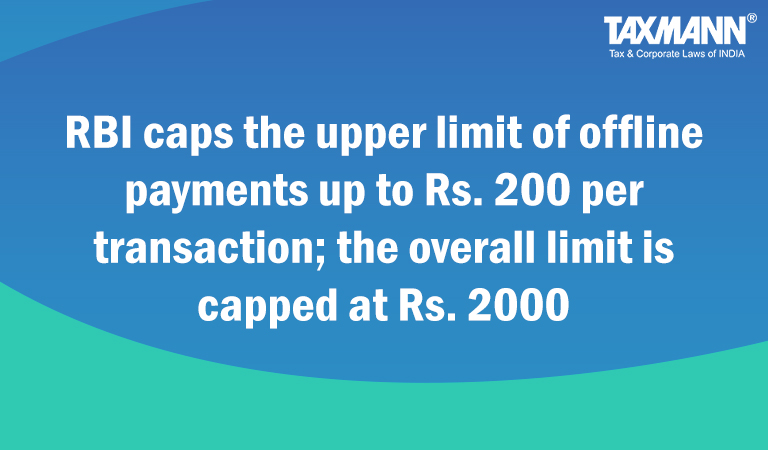RBI caps the upper limit of offline payments up to Rs. 200 per transaction; the overall limit is capped at Rs. 2000
- Blog|News|FEMA & Banking|
- 2 Min Read
- By Taxmann
- |
- Last Updated on 5 January, 2022

Circular No. RBI/2021-22/146 CO.DPSS.POLC.No.S1264/02-14-003/2021-2022, Dated: 03-01-2022
RBI has introduced a framework to enable small value digital payments in offline mode using cards, wallets, mobile devices, etc. The upper limit of an offline payment transaction has been capped to Rs. 200. The total limit for offline transactions on a payment instrument shall be ?2,000 at any point in time. An offline payment means a transaction that does not require internet or telecom connectivity to take effect. With encouraging feedback from the pilots, Under the offline mode, payments can be carried out face-to-face (proximity mode) using any channel or instrument like cards, wallets, and mobile devices. Offline payment transactions may be offered without Additional Factor of Authentication (AFA).
RBI held that payment instruments shall be enabled for offline transactions only after the explicit consent of the customer. These transactions using cards will be allowed without a requirement to turn on the contactless transaction channel, relaxing an earlier regulation declared in January 2020.
The customers shall have recourse to the Reserve Bank – Integrated Ombudsman Scheme, as applicable, for grievance redressal. Reserve Bank retains the right to stop or modify the operations of any such payment solution that enables small value digital payments in offline mode.
Additionally, the acquirer should incur all liabilities arising out of technical or transaction security issues at the merchant’s end. The RBI also highlighted those offline payments will be covered under the provisions of its limited customer liability circulars.
Click Here To Read The Full Notification
Disclaimer: The content/information published on the website is only for general information of the user and shall not be construed as legal advice. While the Taxmann has exercised reasonable efforts to ensure the veracity of information/content published, Taxmann shall be under no liability in any manner whatsoever for incorrect information, if any.

Taxmann Publications has a dedicated in-house Research & Editorial Team. This team consists of a team of Chartered Accountants, Company Secretaries, and Lawyers. This team works under the guidance and supervision of editor-in-chief Mr Rakesh Bhargava.
The Research and Editorial Team is responsible for developing reliable and accurate content for the readers. The team follows the six-sigma approach to achieve the benchmark of zero error in its publications and research platforms. The team ensures that the following publication guidelines are thoroughly followed while developing the content:
- The statutory material is obtained only from the authorized and reliable sources
- All the latest developments in the judicial and legislative fields are covered
- Prepare the analytical write-ups on current, controversial, and important issues to help the readers to understand the concept and its implications
- Every content published by Taxmann is complete, accurate and lucid
- All evidence-based statements are supported with proper reference to Section, Circular No., Notification No. or citations
- The golden rules of grammar, style and consistency are thoroughly followed
- Font and size that’s easy to read and remain consistent across all imprint and digital publications are applied



 CA | CS | CMA
CA | CS | CMA
